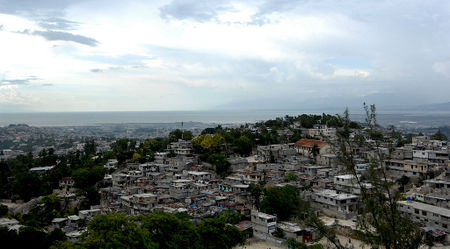Gynopedia needs your support! Please consider contributing content, translating a page, or making a donation today. With your support, we can sustain and expand the website. Gynopedia has no corporate sponsors or advertisers. Your support is crucial and deeply appreciated.
Port-au-Prince: Difference between revisions
Hella Dudes (talk | contribs) |
Hella Dudes (talk | contribs) |
||
| Line 14: | Line 14: | ||
===What to Get & Where to Get It=== | ===What to Get & Where to Get It=== | ||
According to the International Planned Parenthood Federation, there are over 20 types of hormonal contraceptives available. Most that are available are phasic and combined oral pills, but there is also a wide variety of hormonal implants available. There is only one hormonal IUD available by the name of "Mirena." The contraceptive ring (Nuva Ring) does not seem to available for purchase in Haiti.<ref>http://contraceptive.ippf.org/search IPPF</ref> For a comprehensive list of all available hormonal contraceptive available in the country, visit the [http://www.example.com http://contraceptive.ippf.org/search?search.searchtext=&search.component=&search.ctype=&search.countrycode=HT | According to the International Planned Parenthood Federation, there are over 20 types of hormonal contraceptives available. Most that are available are phasic and combined oral pills, but there is also a wide variety of hormonal implants available. There is only one hormonal IUD available by the name of "Mirena." The contraceptive ring (Nuva Ring) does not seem to available for purchase in Haiti.<ref>http://contraceptive.ippf.org/search IPPF</ref> For a comprehensive list of all available hormonal contraceptive available in the country, visit the [http://www.example.com http://contraceptive.ippf.org/search?search.searchtext=&search.component=&search.ctype=&search.countrycode=HT]. | ||
===Costs=== | ===Costs=== | ||
Revision as of 08:31, 28 February 2017
OVERVIEW
Contraception (Birth Control)
General Note: There are many types of contraceptives, also known as "birth control," including IUDs, oral contraceptives, patches, shots, and condoms, etc. If you would like to view a full list, click here.
Laws & Social Stigmas
What to Get & Where to Get It
According to the International Planned Parenthood Federation, there are over 20 types of hormonal contraceptives available. Most that are available are phasic and combined oral pills, but there is also a wide variety of hormonal implants available. There is only one hormonal IUD available by the name of "Mirena." The contraceptive ring (Nuva Ring) does not seem to available for purchase in Haiti.[1] For a comprehensive list of all available hormonal contraceptive available in the country, visit the http://contraceptive.ippf.org/search?search.searchtext=&search.component=&search.ctype=&search.countrycode=HT.
Costs
Emergency Contraception (Morning After Pill)
Important Notes: Emergency contraception may prevent pregnancy for three days (72 hours) and sometimes five days (120 hours) after unprotected sex. Take EC as soon as possible after unprotected sex. If you don't have access to dedicated EC, oral contraceptives can be used as replacement EC, but remember the following: 1) Only some contraceptives work as EC 2) Different contraceptives require different dosages and time schedules to work as EC 3) You must only use the first 21 pills in 28-day packs and 4) They may be less effective than dedicated EC. For general information on emergency contraceptives, click here and here.
Laws & Social Stigmas
What to Get & Where to Get It
Note: The longest-lasting EC is currently ellaOne. It lasts up to 5 days (120 hours) after unprotected sex. Check to see if your country carries ellaOne. If your country doesn't carry ellaOne, copper IUDs may also prevent pregnancy up to 5 days after unprotected sex. If none of these options are available, and it's been over 3 days since you had unprotected sex, you can still take EC, which may work up to 5 days. Note that EC pills are not 100% effective and should be taken as soon as possible.
Costs
Sexually Transmitted Infections (STIs/STDs)
Important Notes - Learn about PEP and PrEP: If you think that you've been recently exposed to HIV (i.e. within 72 hours), seek out PEP (Post-Exposure Prophylaxis). It's a month-long treatment to prevent HIV infection after exposure, and it may be available in your city. Take PEP as soon as possible. For more information, click here. If you are at risk of HIV exposure, seek out PrEP (Pre-Exposure Prophylaxis). It's a daily oral pill that can prevent HIV infection before exposure. To learn more about PrEP, click here.
Laws & Social Stigmas
What to Get & Where to Get It
Testing Facilities
Support
Costs
Medications & Vaccines
Laws & Social Stigmas
What to Get & Where to Get It
Costs
Menstruation
Note: In addition to pads and tampons, you can also use menstrual cups and menstrual underwear for your period. To learn more about menstrual cups, click here. To learn more about menstrual underwear, click here.
Laws & Social Stigmas
What to Get & Where to Get It
Costs
Gynecological Exams
Laws & Social Stigmas
What to Get & Where to Get It
Costs
Pregnancy
Laws & Social Stigmas
What to Get & Where to Get It
Costs
Abortion
Important Note: There are two main types of abortions: medical (also known as the "abortion pill") and surgical (also known as "in-clinic"). For medical abortions, you take a pill to induce abortion. For surgical abortions, a procedure is performed to induce abortion. For general information about medical and surgical abortions, click here.
Laws & Social Stigmas
What to Get & Where to Get It
Costs
Advocacy & Counseling
Laws & Social Stigmas
What to Get & Where to Get It
Costs
List of Additional Resources
References
